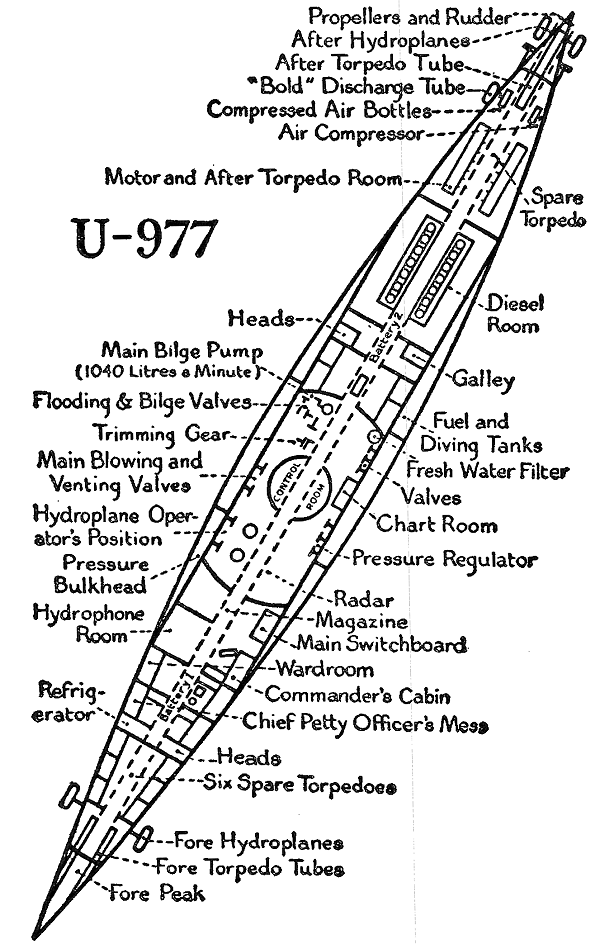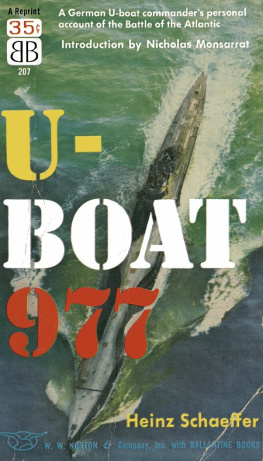Heinz Schaeffer - U-Boat 977
Here you can read online Heinz Schaeffer - U-Boat 977 full text of the book (entire story) in english for free. Download pdf and epub, get meaning, cover and reviews about this ebook. year: 1953, publisher: Ballantine Books, genre: Non-fiction. Description of the work, (preface) as well as reviews are available. Best literature library LitArk.com created for fans of good reading and offers a wide selection of genres:
Romance novel
Science fiction
Adventure
Detective
Science
History
Home and family
Prose
Art
Politics
Computer
Non-fiction
Religion
Business
Children
Humor
Choose a favorite category and find really read worthwhile books. Enjoy immersion in the world of imagination, feel the emotions of the characters or learn something new for yourself, make an fascinating discovery.
- Book:U-Boat 977
- Author:
- Publisher:Ballantine Books
- Genre:
- Year:1953
- Rating:4 / 5
- Favourites:Add to favourites
- Your mark:
- 80
- 1
- 2
- 3
- 4
- 5
U-Boat 977: summary, description and annotation
We offer to read an annotation, description, summary or preface (depends on what the author of the book "U-Boat 977" wrote himself). If you haven't found the necessary information about the book — write in the comments, we will try to find it.
U-Boat 977 — read online for free the complete book (whole text) full work
Below is the text of the book, divided by pages. System saving the place of the last page read, allows you to conveniently read the book "U-Boat 977" online for free, without having to search again every time where you left off. Put a bookmark, and you can go to the page where you finished reading at any time.
Font size:
Interval:
Bookmark:

U-boat 977 is a terrible, heroic record from the other side of the Battle of the Atlantic. It is a tale of Allied ships sunk, of attack, of counterattack, and finally of defeat of the U-boats. It was written by one of the few desperate men who survived that defeat.
Completely authentic, intensely dramatic, it is a personal record of Hitler's most insidious and effective military arm. It begins when the author was a young man starting his training for U-boat service, and carries through the sinkings of Allied ships and the miraculous escapes that brought him his fame. It tells of our growing anti-U-boat war and the horror of the coming of "the worst enemy"radar. And finally he recounts his last incredible dash across the Atlantic, with its stretch of sixty-six days under the sea, to surrender in the Argentine and face the charge that U-977 had been Hitler's escape ship.
Here, also, both in the words and between the lines is a view of the Nazi military machine as seen by one of its human cogsa moving, terrible, and valuable picture presented in terms of dramatic action.

U-BOAT 977
by
Heinz Schaeffer
INTRODUCTION BY NICHOLAS MONSARRAT
Ballantine Books New York
Copyright, 1952, by W. W. Norton & Company, Inc.
Introduction by Nicholas Monsarrat
Preface
1. Yesterday
2. White Sails To Grey Wolves
3. The Grey Wolf Shows its Teeth
4. "Go In and Sink"
5. Christmas Eve
6. Underwater Fuelling
7. Gibraltar Was Hell
8. The Worst Enemy
9. Air Attack
10. Neptune Comes Aboard
11. Awaiting New Weapons
12. My Last Command
13. Sixty Days Under Water
14. Southern Cross
15. "You Hid Hitler"
HEINZ SCHAEFFER was a teen-ager in Berlin, sailing racing sloops for pleasure, when the Nazis came to power. He joined the Germany Navy in 1938 as an officer-trainee, and in May, 1941, he became a submariner. He spent the next four years in U-boats, fighting the Battle of the Atlantic.
The struggle cost the lives of more than 35,000 British and American seamen. It also brought death to 30,000 Germansof those who served in U-boats only one in four survived.
By some miracle Schaeffer found himself alive when the war ended; not only alive but in command of a fully armed submarine, U-977, lurking undetected in the North Sea. Other U-boats surfaced and surrendered to Allied warships. But U-977 dived deep, and became a hunted outlaw.
Schaeffer took her under the sea to the Argentine, where he surrendered and where he now makes his home.
IF U-BOAT 977 were not two thingsa readable book, and an engrossing piece of war historyI would not touch it with a depth-charge.
This point is made at the outset, because I do not wish to figure as an apologist for any part of Germany's war effort. There have been far too many post-war books, films, and plays written to expound the thesis that the Germans, though misguided and misled, were in the main honest manly types who fought the good fight like any Christian soldier; I do not want to run the risk of seeming to belong to this gang. In particular, there has been a determined attempt to present Field-Marshal Rommel (at one time captain of Hitler's personal bodyguard, and head of the Hitler Jugend) as a man who was not really a Nazi at all, just a decent serving officer doing his best for all concerned.
This rubbish has proved readily saleable, as does any claptrap done up in a novelty package, gift-wrapped for the Season of Goodwill; but it is rubbish all the same.
You will recall a remarkable discovery we made when we conquered Germanythat there were actually no Nazis there at all, just millions of "decent Germans" suffering terribly because of the awful things they'd been made to do by other people. You will recall also that General MacArthur found the same thing in Japanthat the Japanese were gum-chewing democrats to a man, and only awaiting the arrival of the Americans to show it. You will recall a general readiness to welcome both the Germans and the Japanese as good chaps who just went off the rails for a bit, fellow club-members after all.
I do not want to belong to that gang either.
Why the Western world should be avid to swallow this particular brand of eye-wash, no man can say. For Nazi Germany was not a nation of honest dupes and simple soldiers: they knew, all of them, exactly what they wanted, and they were prepared to go to any lengths to get it. Until they were beaten (when all colours change over-night) they were total enthusiasts for world-domination, whole-hearted agents of a hideous tyranny which, if not finally checked, would have brought the curtain down on human freedom for generations to come.
They sing sweetly enough now (and others sing for them) : everything now is love, and hands-across-the-trenches. It was, in fact, all a frightful mistake. But twice in this century it has been a mistake: twice these people, and no other, have engulfed the world in misery and bloodshed, in pursuit of their dream of power. The mistake, of course, then as now, was in losing. We forget this at our peril.
Among the worst of these willing servants of world-enslavement were the men serving in German U-boats: which brings us to this book.
No one save a power maniac, a sadist, or a nautical romantic can hold any brief for submarine warfare. It is a repellent form of human behaviour, whether practised by ourselves or by the Germans; it is cruel, treacherous, and revolting, under any flag. There is a current Anglo-American illusion, skilfully fostered during the war, that whereas the Germans used U-boats, which were beastly, we only used submarines, which were quite different, and rather wonderful. (This piece of self-delusion does not persist with those who have ever been at the receiving end of a torpedo.) Of course, there is another side to the medal. It cannot be denied that submariners of any nation are brave and skilful men; and that they are accustomed to continue to exercise their skill in conditions of acute danger, which is perhaps the bravest thing of all. But what they actually do, what constitutes their life workkilling by stealth, without warning and without quarteris evil as well as skilful; moreover, it is predominantly evil, and, when we come to our senses, inexcusably so.
Here then is U-boat 977, a book by a brave and skilful man who was the instrument of this evil tradition. In writing a foreword to such a book, I am not acting on any forgive-and-forget principle; the author, and men like him, were trying to kill me and my friends for five years on end in the Battle of the Atlantic, and I loathed and feared them for it, and I loathe them still. But it is right that, when the fight is over and the U-boats defeated, we should try to learn something of the other side of the picture: that we should know what it was like at the opposite end of the periscope, that we should understand what made these men tickand, in ticking, kill.
We do learn all these things from this book, and that is why it should be read. We learn of the training of young U-boat men, and of their initiation in this special kind of murder. We learn what they felt like when they got their quarry in their sightsand, alternatively, their feelings when, as often happened, they became the quarry themselves, and the depth-charges started to crack and thunder about their ears. The author was, for much of the war, a U-boat commander, and, I should say, a good one, or he would not be alive today; we learn what that was like, too, and the tremendous strain of such a command.
Next pageFont size:
Interval:
Bookmark:
Similar books «U-Boat 977»
Look at similar books to U-Boat 977. We have selected literature similar in name and meaning in the hope of providing readers with more options to find new, interesting, not yet read works.
Discussion, reviews of the book U-Boat 977 and just readers' own opinions. Leave your comments, write what you think about the work, its meaning or the main characters. Specify what exactly you liked and what you didn't like, and why you think so.













